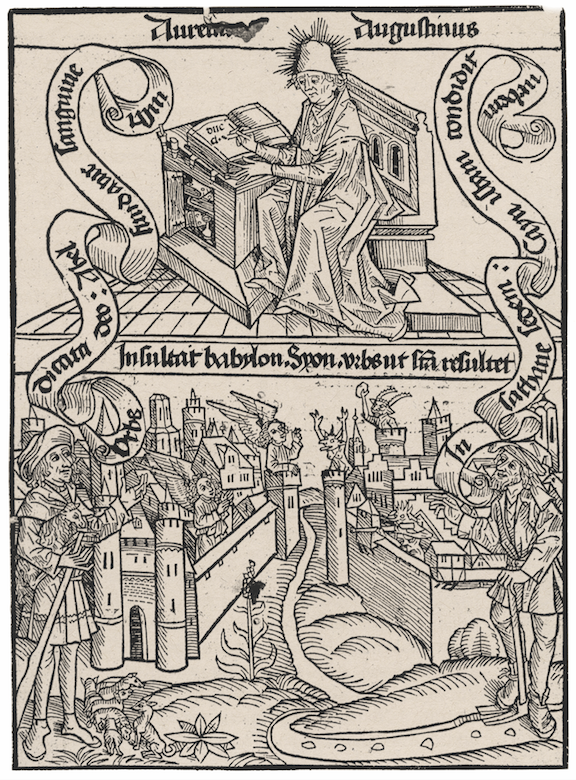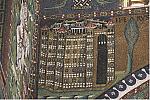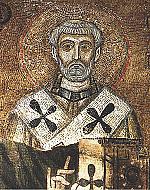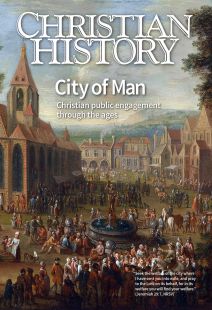City of Man: Did you know?

[Above: Augustine, De civitate dei: woodcut on the back of the title, Nuremberg, 1515—Helmut Schmid / [Public Domain] Wikimedia]
Praying for rulers
[Lord,] make us obedient both to your almighty and glorious name and to all who rule and govern us on earth. For you . . . have given them their sovereign authority. . . . Grant to them, Lord, health, peace, harmony, and security that they may administer the government you have given them without offense.—First Letter of Clement (c. 100)
Claiming another citizenship
[Christians] marry like everyone else, and have children, but they do not expose their offspring [to death]. They share their food but not their wives. They are in the flesh, but they do not live according to the flesh. They live on earth, but their citizenship is in heaven. They obey the established laws; indeed in their private lives they transcend the laws. They love everyone, and by everyone they are persecuted.—Epistle to Diognetus (c. 130 to 200)
Preparing for eternal life
[Christians] will not refuse the discipline of this temporal life, in which they are schooled for life eternal; nor will they lament their experience of it, for the good things of earth they use as pilgrims who are not detained by them, and its ills either prove or improve them.—Augustine, City of God (426)
Stewarding resources
I hold the office of steward to the property of the poor. —Pope Gregory I, letter to Julianus (590)
It seems to me that you have been entrusted with stewardship over the world, not given possession of it. . . . There is no poison more dangerous for you, no sword more deadly, than the passion to rule.—Bernard of Clairvaux, On Consideration (1150) to Pope Eugenius III
Rewarding labors
Who will help me to plow or to sow ere I [go]
Shall have leave, by our Lord! to glean here in harvest. . . .
And all kinds of craftsmen who will honestly live,
I shall find them food that faithfully work.
—William Langland, Piers Plowman, “Piers Sets All to Work” (c. 1370 to 1390)
Serving as leaders
Now the sword is indispensable for the whole world, to preserve peace, punish sin, and restrain the wicked. And therefore Christians readily submit themselves to be governed by the sword, they pay taxes, honor those in authority, serve and help them, and do what they can to uphold their power. . . . If you see that there is a lack of hangmen, court officials, judges, lords or princes, and you find that you have the necessary skills, then you should offer your services and seek office, so that authority, which is so greatly needed, will never come to be held in contempt. . . . The world cannot get by without it.—Martin Luther, On Secular Authority (1523)
Fighting against evil
[The Bible] plainly again and again declares that Christ is again going to rule on earth. How is he going to rule until we get all the rum shops out of the way?—Frances Willard, “Everybody’s War” (1874)
All souls are His, all flowers. An alien power has possessed them, counted them his for so many generations, that we have almost acquiesced in the shameful confiscation. . . . They were never truly his. They belong to the Lord of all the earth, the Creator, the Redeemer. The little Lotus buds are His—His and not another’s. The children of the temples of South India are His—His and not another’s. So now we go forth with the Owner Himself to claim His own possession.—Amy Carmichael, Lotus Buds (1909)
It is wrong to use immoral means to attain moral ends. But . . . it is just as wrong, or perhaps even more so, to use moral means to preserve immoral ends.—Martin Luther King Jr., “Letter from Birmingham Jail” (1963)
Thinking of the common good
To desire the common good and strive towards it is a requirement of justice and charity.—Pope Benedict XVI, Charity in Truth (2009) CH
By The editors
[Christian History originally published this article in Christian History Issue #141 in 2021]








